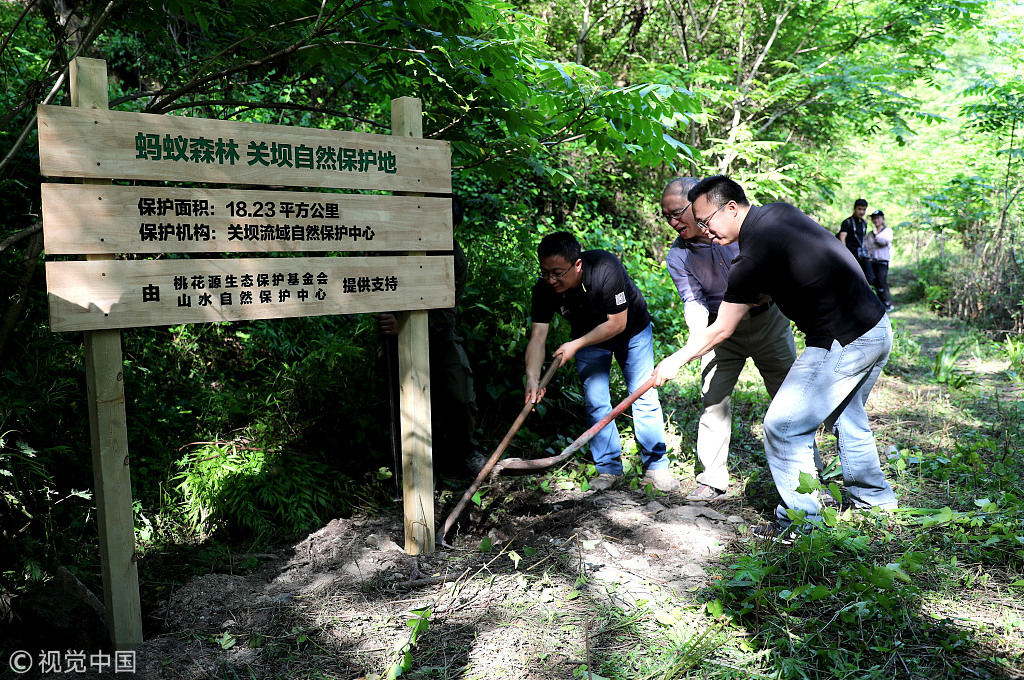
Opinion
08:03, 03-Mar-2019
How is the digital age redefining China's environmental governance?
Updated
22:04, 04-Mar-2019
Wu Changhua

Editor's note: Wu Changhua is the CEO of the Beijing Future Innovation Center and executive director of the Professional Association for China's Environment. The article reflects the author's views, and not necessarily those of CGTN.
The annual session of the National Committee of the Chinese People's Political Consultative Conference (CPPCC) will begin on March 3, 2019, raising the curtain on this year's Two Sessions. Environmental protection has always been a focal point of the annual meeting, and this year is no different.
Digitalization has been reshaping and redefining China's environmental governance landscape. From information disclosure and transparency driven by the government to the environmental movement in social media space, government, business, and the society are joining hands to form the most powerful network ever to protect and enhance the country's ecological security.

Beijing's CBD. /VCG Photo
Beijing's CBD. /VCG Photo
And connectivity via mobile devices offers the most active interface among key stakeholders to participate in policy debate, oversight environmental performance of business and government, and very importantly inspire behavioral changes for a better environmental future.
One example is the program of Pollution Maps. Starting from gathering information of pollution violation released by the government at the local level, Ma Jun, a leading voice of environmental NGOs in China, initiated this program and delivered a product and presentation of Pollution Maps now released on social media on a regular basis.
Nearly one decade later, such a program has become a flagship that attracts companies, Chinese and global, to develop partnership and technology innovation to drive solutions. It also provides strong support for government enforcement of environmental laws and regulations to address pollution and win the declared War on Pollution.
Beijing Air Now is another social media product, created by Zou Yi, who is a well-recognized voice on air pollution in Beijing. Beginning with a simple idea of using a mobile phone to take a photo at the same spot every day around the same time, Zou Yi has developed a large database recording the air pollution visuals and released every day on Weibo, China's own “Twitter.”

Eric Xiandong Jing (R), the CEO of Ant Financial, plants trees in Wuping country, Sichuan Province, May 15, 2018. /VCG Photo
Eric Xiandong Jing (R), the CEO of Ant Financial, plants trees in Wuping country, Sichuan Province, May 15, 2018. /VCG Photo
Six years on, Beijing Air Now has become an important part of people's daily life in Beijing to be informed of air quality. And now enabled by cloud and AI technologies, this platform is transitioning to another level of influence to mobilize nationwide public participation and extend it to a global reach.
The business community has also been stepping up efforts to contribute to a better environmental future. More companies are elevating their corporate social responsibility to focus on an environmental and ecological agenda.
Alibaba, China's largest e-commerce technology company, has been operating a program of Ant Forest via its Alipay, the payment platform. Empowered by fintech and connectivity with consumers, Ant Forest has raised funding and mobilized support to plant 55 million trees in deserts in China. The contribution is perfectly aligned with the national government agenda of and commitment to ecosystems conservation, combating desertification, and climate and biodiversity protection.
Government decision-makers have embraced shifting environmental governance. As learned over the decades, as well as from other countries, a country's environmental protection cannot possibly be achieved only by environmental ministry or agencies.
As reflected in the continuous improvement of environmental legislation, the amended environmental laws and regulations, now in effect, emphasize the role of information disclosure and transparency, as well as the watchdog impact of public and civil society.
For business, while complying with environmental laws and regulations, companies are encouraged to play a more active role in contributing to a large public good. In a context of environmental protection as a top national priority, companies have to make more steadfast efforts to earn its social license to operate.
China's environmental governance is composed of some crucial elements. Top-down remains the key that shapes the core infrastructure and foundation, which enables the bottom-up forces – business, civil society, and the broader public – to participate in and contribute to the current environmental movement in the country.
The amended environmental legislation provides “teeth” – tools, instruments, penalties, and liabilities – to regulate government, business and society in their environmental behavior and performance. The judicial system – environmental courts, criminal charges and prison terms – provides strong arms to drive enforcement.
The digital age empowers every individual to participate in the environmental movement. More capable than ever, companies are enabled to improve their environmental performance and create new assets by capturing efficiency and productivity.
Environmental governance is expected to continue to be an important focus of the 2019 “Two Sessions.” China advances the agenda of ecological civilization. With ambitious goals and targets set at the national level, the government has to work closely with business and civil society to deliver outcomes. Recent developments have demonstrated a new governance landscape being reshaped and a clear pathway towards a sustainable future.
(If you want to contribute and have specific expertise, please contact us opinions@cgtn.com.)

SITEMAP
Copyright © 2018 CGTN. Beijing ICP prepared NO.16065310-3
Copyright © 2018 CGTN. Beijing ICP prepared NO.16065310-3